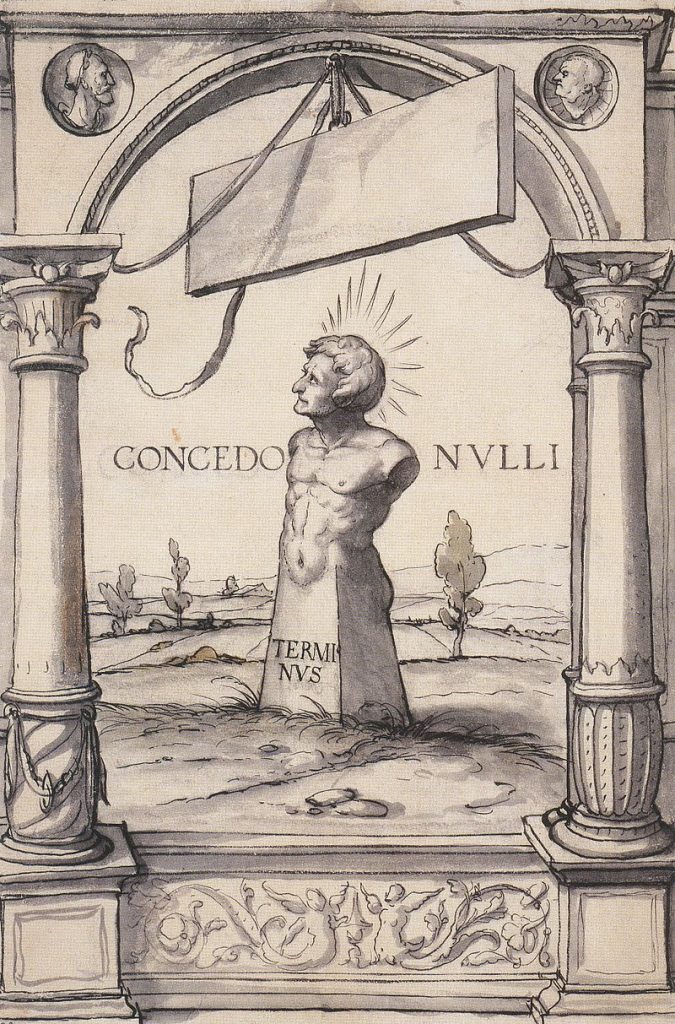
‘Terminus is often pictured as a bust on a boundary stone, His festival is ‘Terminalia’
Today is ‘Terminalia, the Roman day for setting land boundaries. The festival of Terminus was a pastoral outdoor festival marking the boundaries of towns and villages. It resembles the Beating of the Bounds tradition that we have in Britain. This is in recorded, in the UK, from anglo-saxon times, and still continues in some parishes. I will talk about this on Ascension Day in May.
Terminus was an old ancient God who was the God of the boundary, the border, the edge, the liminal God. Ovid says King Tarquinus swept away the old Gods on the Capital Hill and Jupiter became the Great God. All the old temples were taken down except for that of Terminus. Instead, Jupiter’s Temple was built around Terminus’ temple. They put a hole in the roof because Terminus had to be worshipped in the open air.
Terminus’s motto was “concedo nulli” which means “I yield to no one”. This was adopted by Erasmus as his personal motto in 1509.
Terminalia and the Roman Year
The Terminalia was celebrated on the last day of the old Roman year. February was the last month of the year. The rulers of Rome added an intercalary month called Mercedonius in an attempt to keep the Solar year in tune with the seasons. And when the intercalary month was added, the last five days of February were given to the month Mercedonius. The resulting ‘leap year‘ was either 377 or 378 days long. So, in those years, the 23rd of February was the Terminus of the year.
The intercalary months were added at the direction of the Pontiffs, supposedly every two or three years. But the Pontiffs were often swayed by political advantage and delayed the decision. By the time of Julius Caesar, the seasons were wildly out of sync with the calendar year. The Dictator, responded by instituting ‘the Year of Confusion’. This was over 400 days long. It brought in the Julian Calendar which realigned the calendar back in line with the seasons. It resolved the problem by a leap day every four years. This was based on the almost correct calculation of a solar year being 365.25 days. It was another 1500 years before that inaccuracy was corrected. By which time the year was another 11 days out of kilter, and the Julian Year was replaced by the Gregorian Year,
For more on Leap Years and the Roman Year look at my post here.
Ovid & Terminalia
Here is what Ovid, in ‘Fasti’ says about Terminalis
When night has passed, let the god be celebrated
With customary honour, who separates the fields with his
sign.
Terminus, whether a stone or a stump buried in the earth,
You have been a god since ancient times.
You are crowned from either side by two landowners,
Who bring two garlands and two cakes in offering.
An altar’s made: here the farmer’s wife herself
Brings coals from the warm hearth on a broken pot.
The old man cuts wood and piles the logs with skill,
And works at setting branches in the solid earth.
Then he nurses the first flames with dry bark,
While a boy stands by and holds the wide basket.
When he’s thrown grain three times into the fire
The little daughter offers the sliced honeycombs.
Others carry wine: part of each is offered to the flames:
The crowd, dressed in white, watch silently.
Terminus, at the boundary, is sprinkled with lamb’s blood,
And doesn’t grumble when a sucking pig is granted him.
Neighbours gather sincerely, and hold a feast,
And sing your praises, sacred Terminus:
You set bounds to peoples, cities, great kingdoms:
Without you every field would be disputed.
You curry no favour: you aren’t bribed with gold,
Guarding the land entrusted to you in good faith.
If you’d once marked the bounds of Thyrean lands,
Three hundred men would not have died,
Nor Othryadesí name be seen on the pile of weapons.
O how he made his fatherland bleed!
What happened when the new Capitol was built?
The whole throng of gods yielded to Jupiter and made
room:
But as the ancients tell, Terminus remained in the shrine
Where he was found, and shares the temple with great
Jupiter.
Even now there’s a small hole in the temple roof,
So he can see nothing above him but stars.
Since then, Terminus, you’ve not been free to wander:
Stay there, in the place where you’ve been put,
And yield not an inch to your neighbour’s prayers,
Lest you seem to set men above Jupiter:
And whether they beat you with rakes, or ploughshares,
Call out: This is your field, and that is his!
There’s a track that takes people to the Laurentine fields,
The kingdom once sought by Aeneas, the Trojan leader:
The sixth milestone from the City, there, bears witness
To the sacrifice of a sheep’s entrails to you, Terminus.
The lands of other races have fixed boundaries:
The extent of the City of Rome and the world is one
Book II: February 23: The Terminalia
Translated by A. S. Kline copyright 2004
See the following posts for the Roman Year:
Romulus’s 10 month year here
Roman Months here
More on the Ides of March here
Leap Years and the Roman Year
Today, is Sexagesima Sunday. The second Sunday before Ash Wednesday. It comes from the Latin for sixtieth and is very approximately 60 days before Easter. It is the time when we should be reflecting on our sins and lifestyle before we enter Lent.
Discover more from And Did Those Feet
Subscribe to get the latest posts sent to your email.

Most interesting!
Thanks.
thank you!